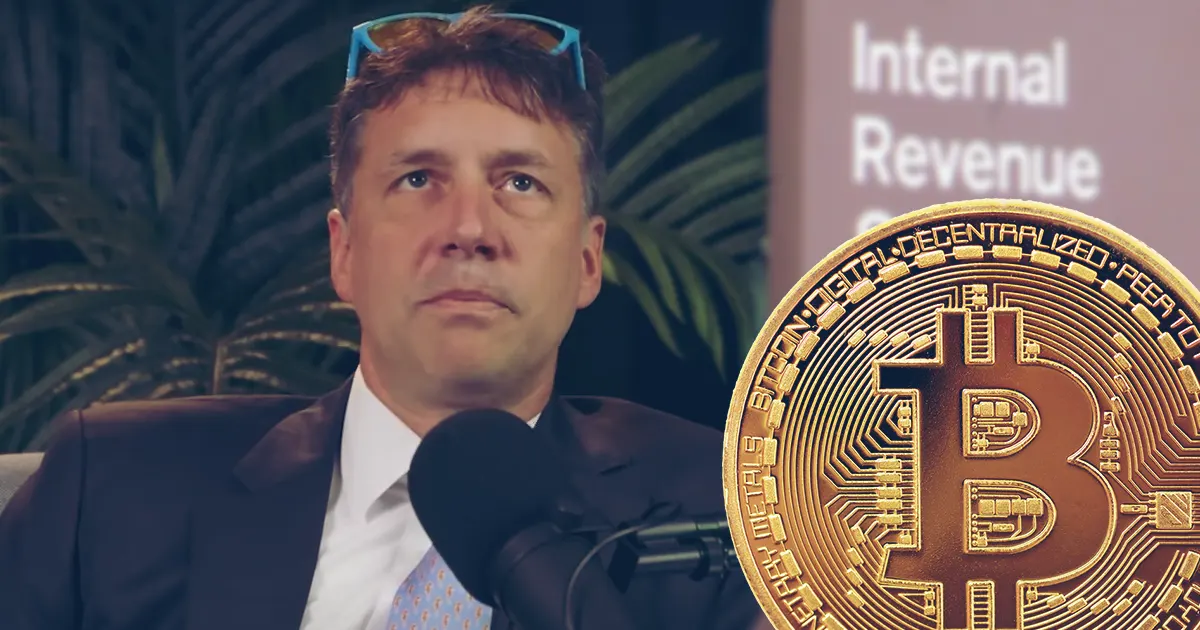The government didn’t build Bitcoin’s infrastructure, so why should they tax it like they own it?
6-7-2025 – Bill Miller IV just said what many of us have been thinking for years: taxing Bitcoin “doesn’t make a ton of sense.” Speaking on Natalie Brunell’s Coin Stories podcast, the Miller Value Partners chief investment officer made a compelling argument that governments have no moral right to tax Bitcoin because they contribute nothing to its operation or security.
When you buy a house, you pay property taxes that fund the government infrastructure maintaining property records, enforcing contracts, and protecting your ownership rights. Fair enough—that’s a service you’re paying for. But Bitcoin? The blockchain handles all of that automatically. No government clerks, no courthouses, no bureaucratic apparatus required. “The blockchain does that property automation for itself, right?” Miller pointed out.
This isn’t just theoretical libertarian philosophy—it’s a practical reality that exposes the fundamental disconnect between how governments think about Bitcoin and what Bitcoin actually is.

The infrastructure argument changes everything
Miller’s point cuts to the heart of why Bitcoin remains so revolutionary, even fifteen years after its creation. Traditional assets rely on government-backed systems for legitimacy and security. Real estate needs deed registries, courts, and police to enforce ownership. Stocks need regulatory frameworks, clearing houses, and legal systems to function. Even gold, that ancient store of value, depends on government assaying, storage regulations, and legal frameworks to trade efficiently.
Bitcoin broke this dependency. It created a self-sustaining system that operates independently of government infrastructure. Every transaction is recorded immutably on a decentralized ledger. Ownership is cryptographically secured. Double-spending is mathematically impossible. The network maintains itself through economic incentives, not bureaucratic oversight.
Yet here we are, watching governments around the world treat Bitcoin like any other asset, subjecting it to capital gains taxes, property taxes, and increasingly complex reporting requirements. It’s like charging road tolls on a highway the government didn’t build and doesn’t maintain.
The “still early” signal hidden in plain sight
What’s particularly telling is Miller’s observation that even professional fund managers face “huge impediments” when buying Bitcoin due to taxation uncertainty. “That’s why I continue to say it is still early because the taxation rules around it are really interesting,” he noted.
This is a crucial insight that many retail investors miss. We’re not just early because Bitcoin hasn’t reached full adoption—we’re early because the entire regulatory and tax framework is still being figured out in real-time. Institutional money managers, the same people who can navigate complex derivatives and international tax law, are still scratching their heads over Bitcoin tax implications.

For Gen X and older millennials who lived through the dot-com boom and bust, this should sound familiar. Remember when Amazon was “just a bookstore” and people questioned whether internet commerce would ever really take off? The smart money wasn’t confused about the technology—they were confused about the regulatory environment. Those who bet correctly on how the rules would evolve made fortunes.
Why this matters more than market movements
Miller’s tax argument represents something bigger than a policy debate—it’s a fundamental question about the nature of property rights in the digital age. If governments can tax Bitcoin simply because it exists and has value, what’s to stop them from taxing any digital asset you own? Your email account? Your social media profiles? Your digital photos?
This matters especially for long-term holders who have watched their Bitcoin appreciate significantly. Every transaction becomes a taxable event, every strategic move requires careful consideration of tax implications. It’s created a bizarre situation where the most revolutionary financial technology in decades is being hobbled by 20th-century tax frameworks.

The whispers about Eric Trump proposing to eliminate capital gains taxes on certain US-based cryptocurrencies might seem like political pandering, but they reflect a growing recognition that current tax policy doesn’t align with Bitcoin’s fundamental nature. “Whether that ultimately happens or not, who knows but it is very cool that there is no wash sale rule on Bitcoin,” Miller noted, highlighting one of the few areas where Bitcoin enjoys better tax treatment than traditional assets.
The counterargument (And why It falls short)
Critics will argue that Bitcoin should be taxed like any other investment because it generates profits and relies on government-protected internet infrastructure. They’ll point to the need for public services and the fairness of everyone paying their share.
But this misses the point entirely. Bitcoin doesn’t generate profits—it appreciates in value as more people recognize its utility as a store of value and medium of exchange. And while it uses the internet, so does every other digital transaction that doesn’t face special taxation simply for existing.
The real issue is that governments are struggling to maintain relevance in a system designed to operate without them. Rather than adapting their approach to acknowledge Bitcoin’s unique nature, they’re forcing it into existing frameworks that don’t fit.
Looking forward: The inevitable compromise
Miller is right about the principle, but wrong about the outcome. Bitcoin probably should be tax-free, but it almost certainly won’t be. Governments need revenue, and they’re not going to voluntarily give up a potential source of it, especially as Bitcoin’s market cap continues to grow.
What we’re likely to see instead is a gradual evolution toward more Bitcoin-friendly tax policies—not because governments suddenly understand the technology, but because they recognize that overly burdensome regulations could drive innovation and capital elsewhere. The countries that get this balance right first will attract the most Bitcoin-related investment and innovation.
For those of us who have been holding Bitcoin for years, Miller’s comments are both validating and sobering. Validating because they confirm what we’ve long suspected about Bitcoin’s unique nature. Sobering because they remind us that the regulatory environment remains the biggest wildcard in Bitcoin’s future.
The question isn’t whether Bitcoin should be taxed—it’s whether governments will be smart enough to recognize that their traditional approaches don’t apply to this new asset class. The answer to that question will determine not just Bitcoin’s trajectory, but the future of digital property rights in general.
The bottom line: We’re still early, taxation rules are still evolving, and the decisions made in the next few years will echo for decades. Pay attention—this is history in the making.


